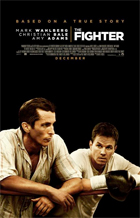The Fighter
|  The Fighter, which tells the real-life story of junior welterweight boxer Micky Ward (Mark Wahlberg), is set primarily in Lowell, Massachusetts, a former textile manufacturing hub that, by the 1980s, had lost most of its industry and was rife with unemployment and desperation. It was also beset with a crack cocaine epidemic so extensive that HBO produced a documentary in 1995 titled High on Crack Street: Lost Lives in Lowell that chronicled the plights of three crack addicts. That documentary becomes a crucial part of The Fighter because one of its subjects was Micky’s older half-brother, Dicky Eklund (Christian Bale), who was himself a former professional boxer who had gone the distance with Sugar Ray Leonard in 1978 and had been subsequently declared “The Pride of Lowell.” Throughout the film we see the HBO filmmakers (one of whom is played by the documentary’s actual director) filming Dicky, who has turned into a self-destructing wreck and a pale shadow of his former self, even though he continues to act as Micky’s trainer. The Fighter, which tells the real-life story of junior welterweight boxer Micky Ward (Mark Wahlberg), is set primarily in Lowell, Massachusetts, a former textile manufacturing hub that, by the 1980s, had lost most of its industry and was rife with unemployment and desperation. It was also beset with a crack cocaine epidemic so extensive that HBO produced a documentary in 1995 titled High on Crack Street: Lost Lives in Lowell that chronicled the plights of three crack addicts. That documentary becomes a crucial part of The Fighter because one of its subjects was Micky’s older half-brother, Dicky Eklund (Christian Bale), who was himself a former professional boxer who had gone the distance with Sugar Ray Leonard in 1978 and had been subsequently declared “The Pride of Lowell.” Throughout the film we see the HBO filmmakers (one of whom is played by the documentary’s actual director) filming Dicky, who has turned into a self-destructing wreck and a pale shadow of his former self, even though he continues to act as Micky’s trainer.The emotional meat of The Fighter lies not in the traditional sports-movie narrative of the ascension of the underdog (although there is plenty of that), but rather in the turmoil of Micky’s dysfunctional family, which is bound together around the common goal of turning him into a champion even as it essentially exploits him for both financial gain and propping up the rapidly degenerating myth that Dicky is still okay. Micky’s mother, Alice (Melissa Leo), is a domineering woman in high heels, too-tight skirts, and a towering bouffant who acts as his professional manager while also managing the emotional lives of Micky’s six sisters and her second husband, Jack (George Ward). Alice is a fireball whose maternal command is supported by her daughters, who function as a chorus of catty minions, but her bravado hides a fundamental weakness, namely her refusal to face up to Dicky’s increasingly desperate predicament, even after he must repeatedly be pulled away from a local crack house to train his younger brother. Micky is essentially caught in Dicky’s shadow, never able to assert himself, either professionally or emotionally. Whatever success he might have is always attributed to Dicky’s training, and when he fails it is brushed aside as an anomaly. The bruises and swollen flesh of the beating he takes from an obviously superior opponent against whom he never should have fought remind us that he is the familial punching bag, carrying the burden of his brother’s sins and missed opportunities, but not allowed to accept any help that might actually lead to success. For the family, it is better for him to fail under their wing than succeed beyond it because to do so would shine a harsh light on the reality that they are holding him back. Micky finally manages to assert himself after becoming involved with Charlene Fleming (Amy Adams), a tough, local barkeep who is every bit as fiery as Alice but also recognizes how Micky is a victim of his own family and must break from them if he is ever to succeed, a move that his family brands as treasonous. The fact that Micky essentially moves from his family’s guidance to Charlene’s suggests that he would be lost without someone leading the way, but it is understandable given how he grew up idolizing Dicky and was never allowed to flourish on his own. He is a man constantly in need, and the film is ultimately a bit muddy in reconciling this with the emotional requirement that everyone come together in the end. Despite all the grit and the grime, The Fighter wants to uplift everyone on the screen and in the theater. The screenplay by Scott Silver, Paul Tamasy, and Eric Johnson moves clearly through Micky’s emotional and professional trajectory, while director David O. Russell sheds the avant-garde wackiness of his last film, 2004’s I Heart Huckabees, in favor of a traditional approach that emphasizes character and emotion over visual razzle-dazzle. In its best moments, The Fighter plays as a powerful anthropological portrait of how an economically strapped, tight-knit family can become suffocating for those who are not part of the power structure, and Russell’s close attention to time and place keeps the histrionics grounded. The severity of the family situation is closely tied to the fate of Lowell itself, a shell of its former self, which reflects both Dicky’s dire circumstances and one of Micky’s potential fates if he does not find a way to break free. Wahlberg keeps Micky tightly wound, and his potential for blankness on screen works perfectly here, as it conveys the character’s forced need to stand in the background. Christian Bale, on the other hand, gives another one of his electric, crazed performances, shedding pounds of muscle to depict a gaunt failure of a man who is desperately trying to convince everyone around him that he is on a “comeback”; the wild look in Bale’s eyes and the ferocity of his increasingly transparent motormouth charms make him both detestable and pitiable. The only place where the film really stumbles is in the depiction of Micky and Charlene’s relationship, which is never fully explored. Adams does all she can with the role of Charlene, which requires her to be in frequent conflict with the women in Micky’s family who recognize that they are being usurped by someone for whom they have no respect, but we never sense the connection between her and Micky. They go from an awkward first date to being in a committed relationship, which is thereafter assumed to be a given. It works narratively, but not emotionally, which is jarring in a film that is otherwise cut through with so much heart and soul. Since Micky and Charlene’s relationship is the catalyst that helps Micky break free and march toward becoming his own person, it is a shame that The Fighter couldn’t find a way to make their relationship more central to its emotional impact. Copyright ©2010 James Kendrick Thoughts? E-mail James Kendrick All images copyright © Paramount Pictures |
Overall Rating: 

 (3)
(3)


